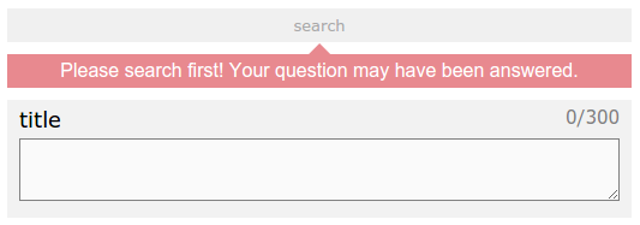Let's get one thing right: there are no stupid questions, especially in the realm of tech. Technology advances at such a rapid pace that it's easy to be left in the dust, so it's normal to have questions.
That being said, when you need tech-related help, how you ask your questions is often more important than what you're asking -- and if you don't ask properly, many knowledgeable IT folks will ignore you. Has that happened to you before? It's happened to me, and it sucks.
What I've learned is that there are common mistakes that people make when asking questions, and it's these mistakes that make experts less likely to lend a helping hand.
Want to stop being ignored? Here's what to avoid whether you're asking a friend, a tech support forum, or customer service live chat.
1. Asking People Before Google
Let's face it: it feels more natural to us, as human beings, to ask our questions to other human beings. (Unless you're under 20 and grew up with Google and Wikipedia as your primary household educators.)
It makes sense, too. People are dynamic. You ask them a question and most won't stop at a one-line reply -- they'll converse with you, back and forth, until you find the answers and explanations you sought all along. This is great for open-ended questions that are complex and meaty.
But when it comes to simple and straightforward questions, it's just better to use a search engine.
Questions that start with "What?", "Who?", or "Where?" are usually simple. They're factual, which is what Google and Wikipedia excel at. On the other hand, questions that start with "How?" and "Why?" aren't as easy to answer.
Still, always consult Google and Wikipedia first. If you're on a forum like Reddit, use the website's built-in search feature to look around. People hate answering frequently asked questions, and if you're asking a question that's been asked a million times before, people will roll their eyes and move on.
One benefit for you is that search engine results are instant. You don't have to wait for other humans to read your question, process their thoughts, and type out a response. It's fast and convenient -- why wouldn't you consult Google or Wikipedia first?
2. Asking Questions That Are Vague
To maximize the chance of someone answering your question, you have to be as straightforward as possible. Get to the point quickly. Present the problem as clearly as you can. The longer it takes for the reader to process your question, the more likely they'll be to shrug and move on.
In other words, vagueness is the enemy of finding answers.
Imagine if you got a call from a friend, and as soon as you picked up, the first words you heard were, "How do I fix my car?" At that point, the question doesn't make sense. Which part of the car is broken? How old is the car? What was he doing when the car broke? These are important details.
The problem with a vague question is that it offers no context. Without proper context, a question like that could be answered in a million different ways. You could ask the question anyway, but you'll end up wasting a lot of time as helpers reply with follow-up questions to narrow down the issue.
At the end of the day, people hate having their time wasted -- so don't waste their time with vague questions. Be clear up front:
- What's the specific issue? (e.g. Computer won't boot up)
- What are the relevant symptoms? (e.g. a long beeping tone)
- What have you tried already? (e.g. memory diagnostics test)
- Anything else that's relevant? (e.g. just installed Windows 10)
3) Asking Too Many Things at Once
This particular mistake isn't as common as the others, but it's almost a sure-fire way to guarantee that no one will help you out: stop bombarding people with multiple questions at a time!
As a helper, a forum post that contains a dozen different questions/problems is daunting. Every additional question is extra research that needs to be done or extra time spent in typing up a reply. For a lot of helpers, that extra effort isn't worth the energy.
Along similar lines, asking too many follow-up questions is bad.
Here's the thing about helpers: they like to feel like they've helped. Some helpers are more altruistic than others, but everyone gets some measure of satisfaction when they're able to help another person solve an issue.
When you ask too many follow-up questions, you rob that feeling of satisfaction from your helpers, and it makes them less likely to keep helping you -- especially if they've already put in a lot of effort in their first response to you.
If your problem wasn't actually solved or if you need additional clarification, that's fine. If your problem was solved and you're now introducing a separate problem, then that's bad. Wait a while. Don't overwhelm your helpers.
4) Asking In an Annoying Way
If you find yourself in need of help, make sure you show a bit of respect to those who might potentially help you. A little bit of kindness and humility goes a long way, especially when you're on the Internet (where most people are anonymous jerks).
For example, don't be annoying. If you're frustrated by your situation and need to blow off steam, do that elsewhere. When anger and irritation are palpable in your question, it makes people less likely to offer their insights.
Similarly, if someone does offer you their help but it doesn't actually solve your issue, don't antagonize them. Be grateful that they tried to help at all. Nothing kills the desire to help faster than a jerk with an ungrateful or condescending attitude.
And one final note: even if English isn't your primary language, try to be grammatically correct and use proper spelling. From the helper's perspective, it's too much of a bother to decipher a plea for help that's littered with typos, broken sentences, and abbreviations like "u", "ur", and "plz".
Again, a little bit of online respect and good etiquette can go a long way.
What Other Reasons Are There?
In a lot of ways, these tips for "asking better questions" can be seen as an offshoot of what it takes to have a productive online discussion. It's important to keep a positive attitude, foster an encouraging atmosphere, and treat others as human beings (which is tough thanks to an anonymous Internet).
These things are not only important for making your arguments stronger, but they're also important for fighting online harassment.
Are your requests for support usually ignored? What kinds of mistakes would prevent you from answering another person's question? Share with us in the comments!





